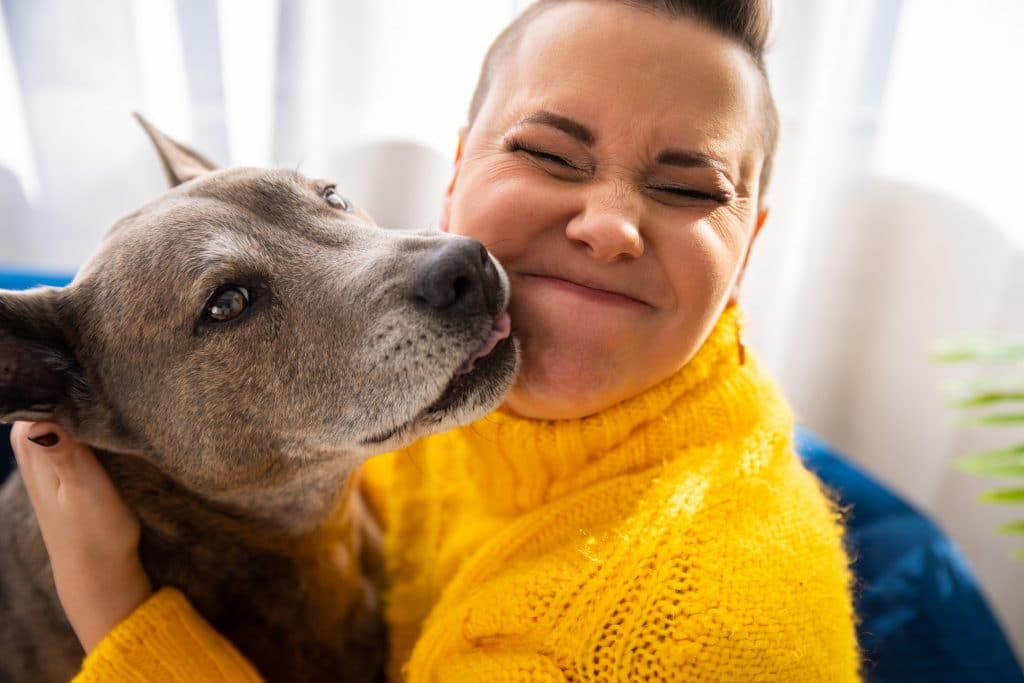- This post contains affiliate links. Read more here.
- Not a substitute for professional veterinary help.
As you get older, you might notice stiffer and achy joints. Our dogs are no different. Arthritis affects around 20% of all dogs over one year old, and that number only rises as dogs age. Common symptoms of arthritis in dogs include stiffness, favoring an arm or leg, and a general lack of energy.
“Dogs with arthritis may be reluctant to exercise, play, or go up and down stairs,” says Jennifer Sperry, a veterinarian with Pets Plus Us Insurance. Arthritis can impact your dog’s quality of life and force you to take a rain check on fun outings. Luckily, there are ways you can help manage your dog’s symptoms and even lower their chances of developing arthritis in the first place.
Below, learn more about how arthritis can impact your pup’s health and get tips on supporting healthy joints.
What Are the Types of Arthritis in Dogs?
There are several different subtypes of arthritis in dogs, but some of the most common include the following.
- Osteoarthritis: “Osteoarthritis is the most common form of arthritis in dogs,” says Dr. Sperry. It’s a chronic condition that causes dogs to gradually lose their joint cartilage, causing pain and inflammation in their limbs.
- Autoimmune arthritis: Sometimes, your dog’s immune system can attack itself, resulting in Rheumatoid arthritis. This autoimmune form of arthritis causes joint inflammation and cartilage loss.
- Septic arthritis: “Septic arthritis occurs when there is a bacterial infection within the affected joint itself,” Dr. Sperry explains. This bacteria can enter your dog’s body through a wound or even during surgery. Beyond common arthritis symptoms, it can also cause fevers.
What Are the Symptoms of Dog Arthritis?
If your dog has arthritis, you may notice some of the following symptoms.
- Walking stiffly or limping
- Loss of stamina during exercise or walks
- Difficulty getting up or lying down
- Reluctance to exercise, play, or go up and down stairs
- Lameness in affected limbs
- Not wanting to be touched in certain areas
- Uncharacteristic fear, aggression, or irritability
What Causes Arthritis in Dogs?
Certain factors can influence a dog’s likeliness to develop arthritis, including:
- Age: Older dogs are more likely to develop osteoarthritis. In fact, it’s estimated that arthritis affects over 80% of dogs over the age of eight.
- Breed: Dr. Sperry says some breeds are more susceptible to osteoarthritis than others. These include large dogs, like Labradors and Bernese Mountain Dogs, “long and low” breeds like Basset Hounds, and brachycephalic dogs like Frenchies.
- Obesity: Dr. Sperry explains that overweight or obese dogs are at an increased risk of arthritis due to the extra strain on their joints.
- Past injuries: Dogs with past injuries, fractures, or infections may face a higher risk of developing arthritis.
- Lifestyle: High-energy, super-active dogs love constant activity. However, Dr. Sperry says this repetitive strain can lead to arthritis.

iStock/NickyLloyd
How To Treat Arthritis in Dogs
If your vet detects arthritis in your dog, they may suggest a few different treatment methods, depending on your dog’s specific arthritis subtype and the severity of their condition. Some of the most common dog arthritis treatments include the following.
Medications
Non-steroidal anti-inflammatory drugs (NSAIDs) help ease joint inflammation and pain. But while NSAIDs can help dogs experience arthritis symptom relief, they can also cause side effects, like diarrhea, lethargy, low appetite, and vomiting. So, watch your dog and relay any abnormal symptoms to your vet.
Physical therapy
Some dogs may benefit from a more therapeutic exercise method, like swimming or walking on an underwater treadmill. The buoyancy of the water takes the pressure off your pup’s joints for a more comfortable workout. After a few weeks, many dogs will feel more energetic and excited for walks.
Surgery
For extreme cases of osteoarthritis, vets might perform surgery, like a hip or knee replacement, to ease the pain. Other common arthritis surgeries include fusing joints together or removing the affected part of the joint.
How Can You Prevent Arthritis in Dogs?
Since some breeds are more genetically prone to arthritis than others, you can’t always prevent arthritis. However, there are ways you can lower certain risk factors, including the methods below.
1. Manage their weight
Since extra weight puts more pressure on your dog’s joints, helping them stay at a healthy size can lower their chances of developing arthritis. Speak with a vet or nutritionist to make a proper weight-loss plan for your pup.
2. Pick nutrient-dense food
“Calcium and phosphorus balance during growth is important for healthy bone development,” Dr. Sperry says. Look for weight-loss food formulated for your dog’s age, size, and breed so they can get the right dosage of nutrients.
3. Prioritize regular exercise
Like humans, Dr. Sperry explains that regular exercise helps maintain healthy muscle mass and lean body weight to protect against arthritis. For example, take your dog for a brisk walk every day or let them indulge in a few laps around the pool. Just make sure to moderate more intense exercise, like long hikes, especially if your dog isn’t used to the activity.
4. Incorporate joint health supplements
Dr. Sperry says that certain supplements may promote your dog’s joint health. Some common joint health supplements can include:
- Fish oil (with Omega-3 fatty acids) to ease inflammation
- Glucosamine to lubricate joints
- Chondroitin helps with inflammation and pain
5. Schedule routine vet check-ups
All dogs should visit the vet for checkups at least once yearly, even if they’re not sick. Taking your dog to the vet can help them spot signs and symptoms of arthritis early and devise a treatment plan to keep your pups’ joints feeling flexible.
6. Make environmental modifications
If your dog has trouble navigating the house, try adding mobility aids to help them get around to prevent further strain. For example, add a ramp to the couch to help them get on and off without jumping.

Courtesy of Kristen Kidd.
Can Dogs Ever Recover from Arthritis?
Since arthritis destroys joint tissue, it’s not always possible to reverse the damage. In fact, osteoarthritis is a chronic condition that stays with dogs their entire lives. But the earlier you can catch arthritis, the better your chances of limiting its spread. That’s why regular vet checkups are key to detecting early signs and symptoms.
With your vet’s help and a few interventions of your own, you can help your pup live a long and healthy life with plenty of playful years together.





